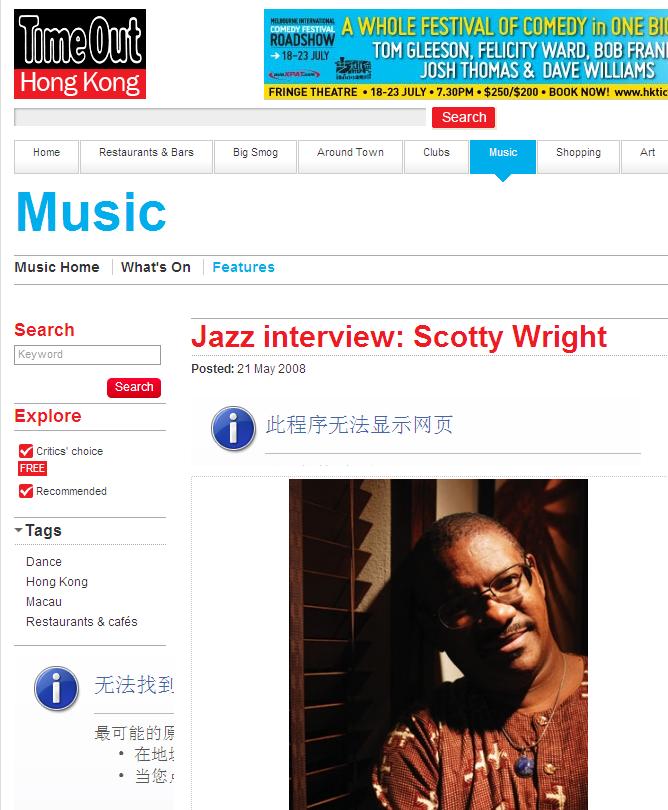|
|

樓主 |
發表於 2011-7-19 14:50
|
顯示全部樓層

http://www.timeout.com.hk/music/ ... -scotty-wright.html
Born on November 5, 1954 in Charleston, South Carolina, USA, and self-taught on voice, piano and percussion, Scotty Wright is an authentic jazz singer-pianist. No stranger to the HK jazz scene, Wright had an exclusive engagement in 1996 at the now defunct jazz club Quo Quo, where his take on Joe Zawinful’s Mercy, Mercy, Mercy with Eugene Pao was among the best versions I’ve heard anywhere. Wright will be performing every night (except Sundays) at the Captain’s Bar, Mandarin Oriental Hotel until the end of June.
What’s your own interpretation of jazz?
Freedom. Jazz was a form of music built on the desire to achieve freedom. Every important musical moment has been an extension of jazz. As musicians, we have to free ourselves from what we believe we know, and reach deep into what we don’t know.
Do you think the new generation needs a jazz education?
Jazz begins with attraction. It does not begin with knowledge. When you see a beautiful woman, you’d like to know more about her. Jazz is the same – as you hear more, you learn more. We, as jazz musicians, have a responsibility to share its positive energy with the general public. As for the younger listeners, with the prevalence of MTV, kids are now listening to pop and rock only. Few people listen to jazz these days.
You released a CD called Rhythm, Reason & Rhyme in 1995. It’s a beautiful CD. You must be very proud of that project.
Yes, it was a last-minute project produced by a small indie label in San Francisco. I chose only compositions written by jazz artists – from medium swing to ballads.
And in that album, you wrote your own lyrics to J.J. Johnson’s Lament.
Yes, I’ve always loved that song. Almost a week after I wrote the lyrics, I discovered four different versions of it. But I [still] like mine the best.
In 2001, you recorded a duo album with the legendary pianist Cedar Walton. Tell me about that experience.
That was a lot of fun. The concept of the album was to replicate the mood, if not the repertoire, of the Bill Evans/Tony Bennett album. Cedar was such a gentleman and was very professional during the recording session. I didn’t play piano on that recording. When you have Cedar in the room, there is no need for another piano player.
Who are some of your favorite piano players?
Well, the best compliment a pianist can get is when somebody says, “He has his own sound.” For me, I like pianists’ styles that are so distinctive people don’t even dare copy them. My big four are Bill Evans, Nat Cole, Thelonious Monk, and Oscar Peterson.
It’s great you mentioned Nat King Cole. Most people know him as one of the greatest singers in history, but few remember he was a fabulous pianist.
It’s a shame. They are missing two thirds of the man. Nat made it very simple – and he demonstrated how a singer-pianist could best function.
Henry Chung is one of Hong Kong’s leading bluesman and harmonica players |
|











